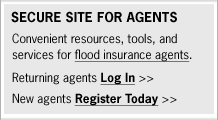
You have flood insurance and have done your best to prepare. Here’s what you can do once flooding has started to keep your family safe.
- Fill bathtubs, sinks and jugs with clean water in case water becomes contaminated.
- Listen to a battery-operated radio for the latest storm information.
- If local authorities instruct you to do so, turn off all utilities at the main power switch and close the main gas valve.
- If told to evacuate your home, do so immediately.
- If the waters start to rise inside your house before you have evacuated, retreat to the second floor, the attic, or if necessary, the roof.
- Floodwaters may carry raw sewage, chemical waste and other disease-spreading substances. If you've come in contact with floodwaters, wash your hands with soap and disinfected water.
- Avoid walking through floodwaters. As little as six inches of moving water can knock you off your feet.
- Don't drive through a flooded area. If you come upon a flooded road, turn around and go another way. A car can be carried away by just two feet of flood water.
- Electric current passes easily through water, so stay away from downed power lines and electrical wires.
- Animals lose their homes in floods, too. Be aware that even domesticated animals may be confused and unpredictable in a flood situation.



Last Updated: Monday, 05-Jan-2009, 2:37 PM (EST)

500 C Street SW, Washington, D.C. 20472
Disaster Assistance: (800) 621-FEMA, TTY (800) 462-7585
U.S. Department of Homeland Security
FEMA Home | Contact FEMA |
Privacy Policy | Important Notices |
FOIA | USA.gov | DHS
